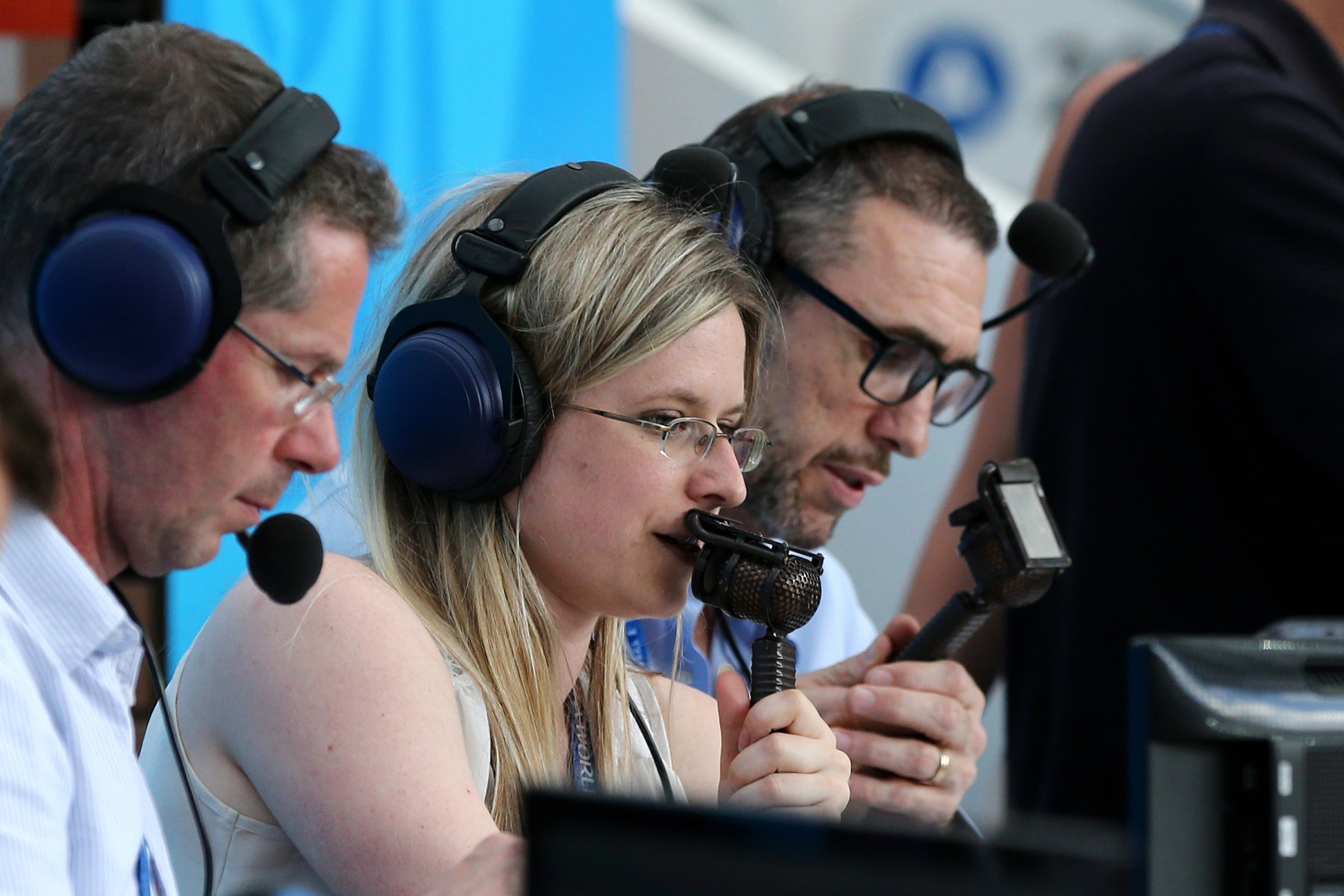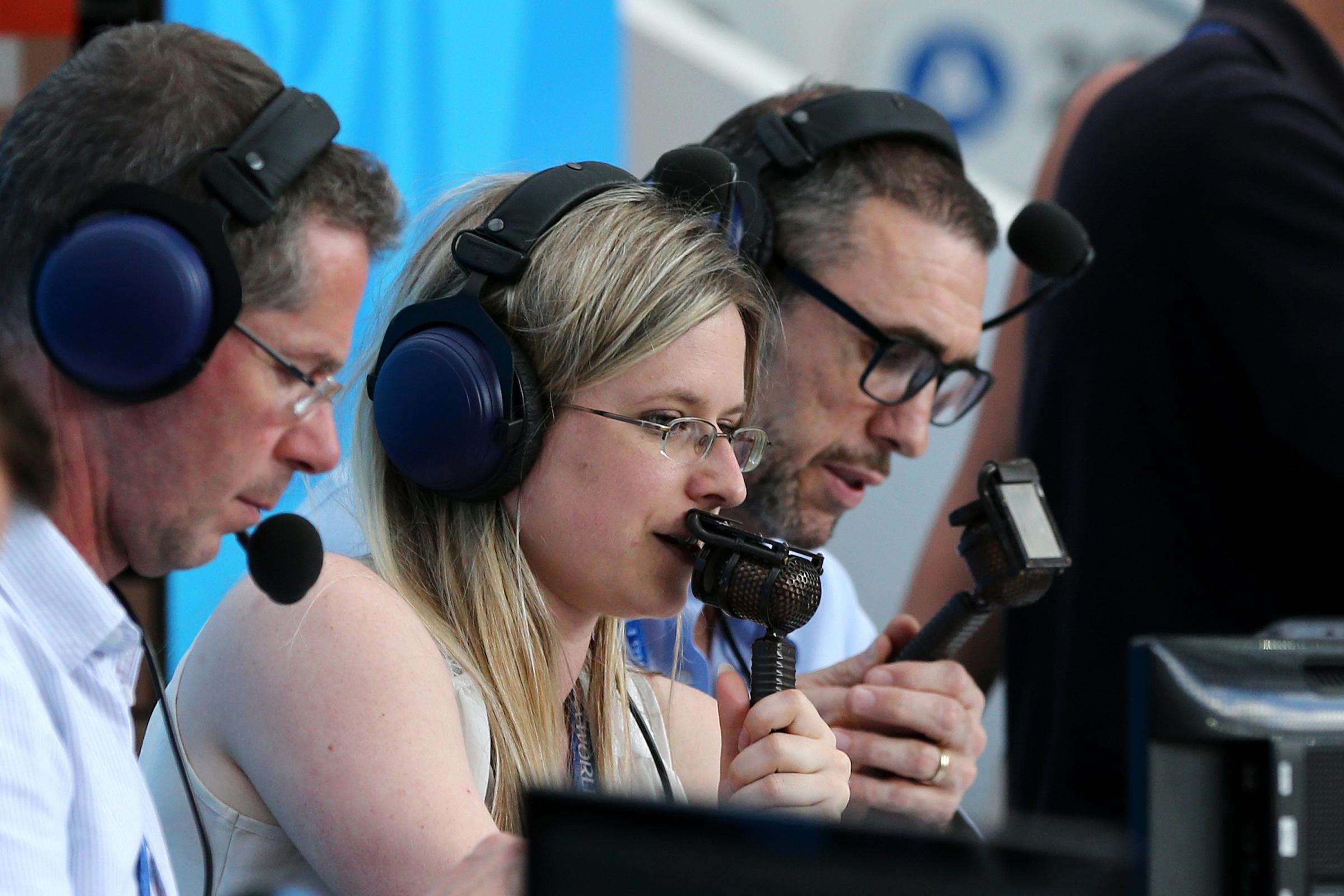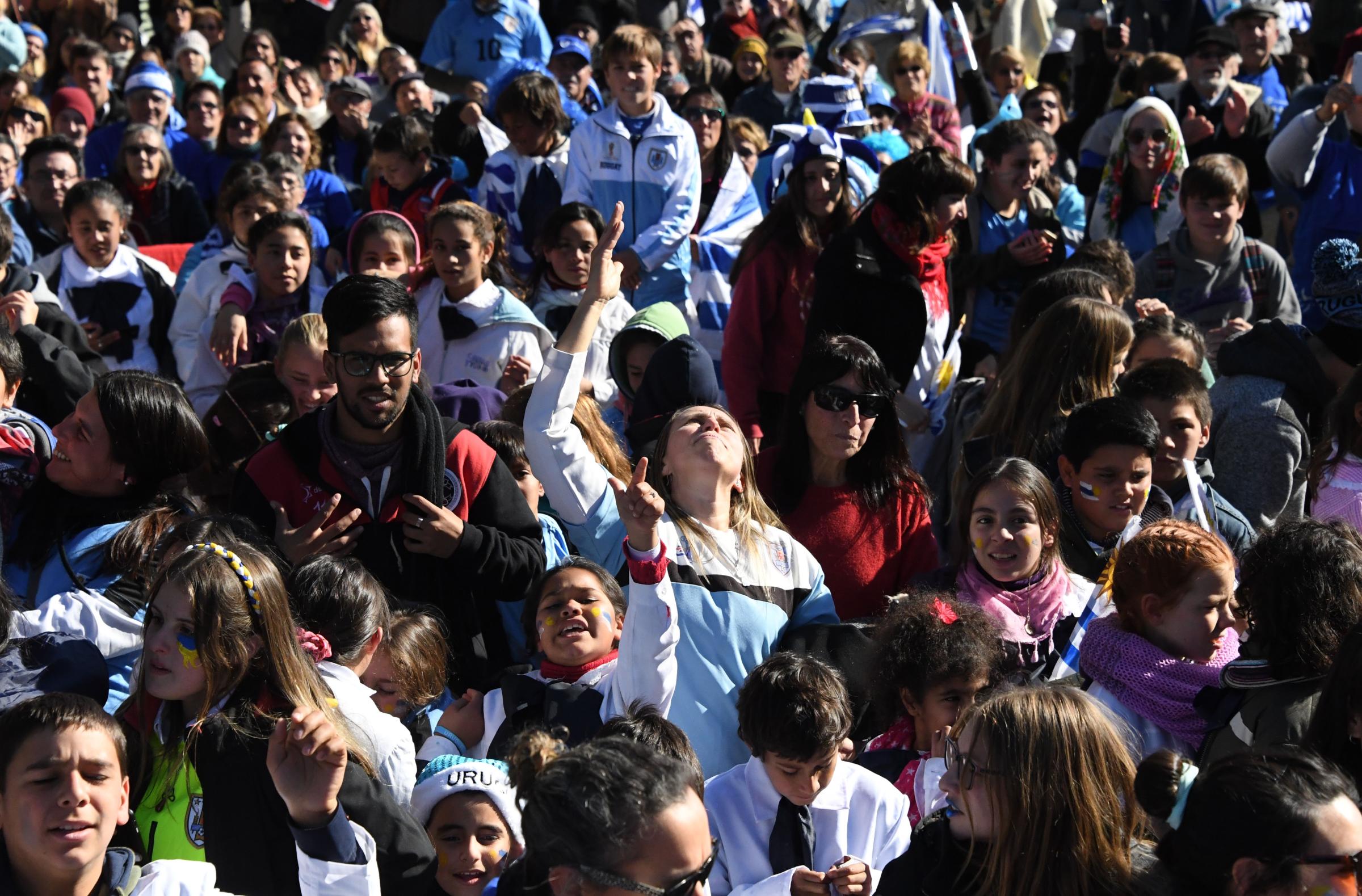
From late goals to major upsets, the World Cup in Russia this year has had more than its usual share of excitement. While more women have had high-profile sports commentary roles this year than ever before, a series of sexist incidents have provoked outcry.
During the tournament, several women working for international media outlets have been harassed and assaulted while doing their jobs. Male fans have coached women to chant sexually graphic phrases in languages they don’t understand. Even away from the crowds outside the stadium, women working from the relative calm of a studio have received online abuse just for daring to work in the male-dominated world of soccer.
The soccer world is no stranger to sexism. As is typical of many sports, the men’s version is thought of first—British pundit Gary Lineker was called out on Twitter for crediting Lionel Messi with a world soccer first, despite American soccer player Mia Hamm and China’s Sun Wen achieving the same in 2003. In Britain, thought of as the home of the sport, the women’s game was banned for 50 years until 1971, and was only officially brought under the British soccer governing body in 1993. It’s only in recent years that women have taken roles in FIFA, the sport’s global governing body, with the first board members being elected in 2013, and the first ever secretary general in 2016. Progress has been slow across the board, with top European leagues only getting their first ever female referee last September (in Germany); there are no female refereeing staff at this World Cup. Sports journalists in several countries marked milestones in Moscow, becoming the first to commentate live men’s matches on television. (In the U.S. Fox Sports and Telemundo both had the country’s first ever live commentary from women, while in the U.K., where women have commentated live soccer on the radio, the BBC’s Vicki Sparks made history as the first woman to commentate a live televised men’s match.)

What’s different about this year’s World Cup is the rise of call out culture. As Anna Kessel, sports journalist and chair of British campaign group Women in Football says, “For the first time, we’re having a global awakening about what women in the sport face.” In the wake of the #MeToo movement across other industries, more women in soccer are talking about their experiences—and the world is listening.
For those working in front of the camera, the grabs, gropes and kisses have taken place in full view of the world. On June 15, Colombian-born journalist Julieth Gonzalez Theran was delivering her lines for Deutsche Welle to camera when a soccer fan grabbed her chest and forcibly kissed her. Three days later, Malin Wahlberg was presenting, talking to a crowd of Swedish fans for the country’s Aftonbladet newspaper, when a rowdy fan draped an arm around her shoulder, another another vigorously ruffled her hair and a third grabbed her round the neck and went in for a kiss she tried to dodge. Mexican journalist Mariana Zacarias has told Paris Match about being groped, kissed and grabbed in the first two weeks of the tournament. On June 24, Julia Guimaraes, presenting for Brazil’s TV Globo and sporTV, dodged a man who tried to kiss her on the cheek, berating him afterward with a wave of her mic.
https://twitter.com/dw_espanol/status/1007240122138492928
It’s not just women on the job who have had to deal with sexist crowds. Fare Network, part of a global network of organizations tackling discrimination in soccer, has reported several instances of fans persuading women from different countries to chant crude and sexual phrases in a language they don’t understand. “There’s the very visible issue of TV reporters who are being assaulted on the streets while they’re working, and there’s another aggressive, sexualized misogyny that’s new. I’ve never seen that before,” says Fare’s executive director Piara Powar, describing the videos.
In one video Fare highlights, two Paraguayan journalists taught a woman an obscene phrase, telling her it meant “I like Paraguay,” and in another Colombian fans taught Japanese women to say obscene phrases. Paraguay—which is not playing at the World Cup—condemned the journalists through its Russian embassy, and Colombia’s government said the behavior was “degrading to women and insults our country” on Twitter. “All these things are highlighting old, sexist attitudes, and that most of the people who travel are men,” says Powar. “It’s something the culture of [soccer] hasn’t tried to address.”
Several female pundits have also been trolled online—and action is being taken. German pundit Claudia Neumann, the first woman to commentate men’s matches on German public television, has been subject to online abuse, with her employer ZDF now pursuing criminal charges against two users who expressed “extremely derogatory comments,” according the German newspaper Allgemeine Zeitung. ZDF director Thomas Bellut said he hoped it would have a deterrent effect, and expressed surprise that “apparently some viewers still have a problem with a woman commentating.”
Elsewhere, others have been displeased that the playing field is becoming more equal. Jason Cundy, who played for British top-level soccer club Chelsea, came under fire last week for his assertion on breakfast TV that female commentators were a “tough listen,” saying “a high-pitched tone isn’t what I want to hear.”

Powar of Fare Network says that the media—and soccer as a whole—has its own role to play in helping change sexist attitudes, by making the presence of women a regular feature across the board, rather than a one off at big tournaments. Female pundits Eni Aluko and Alex Scott, who work for the U.K.’s two major networks, have drawn praise for their insightful commentary—as well as what some have called patronizing applause from a fellow male pundit. “They clearly understood they had to prove themselves, they had to work harder than the men,” says Powar. “They’ve done their homework.”
The commercial argument for change is strong: Women’s soccer is among the fastest growing sports in the world—and in the U.S., women’s soccer has for years been more popular than men’s. Kessel points to two campaigns this World Cup that were disbanded after an outcry over sexism—Burger King’s offer to give prizes to any woman impregnated by a player, and Getty’s gallery of “hottest fans” featuring only young women. “It’s been standard for galleries and TV feeds to feature this narrow idea of women at the football. This is first time there’s been such a big platform for change,” Kessel says. Women are a significant audience at World Cups: FIFA’s own viewing figures show women were around 40% of the audience for the 2014 tournament. And where there are viewers, there are advertising dollars.
But for women on the ground right now, sharing their experiences and immediately condemning sexism has been essential to effecting change more quickly. As Julieth Gonzalez-Theran said in a post on her Instagram after she was groped, the women reporting are doing their jobs and they deserve respect: “Respect! We don’t deserve this. We are equally valuable and professional. I share the joy of soccer but we must identify the line between affection and harassment.”
More Must-Reads From TIME
- The 100 Most Influential People of 2024
- The Revolution of Yulia Navalnaya
- 6 Compliments That Land Every Time
- What's the Deal With the Bitcoin Halving?
- If You're Dating Right Now , You're Brave: Column
- The AI That Could Heal a Divided Internet
- Fallout Is a Brilliant Model for the Future of Video Game Adaptations
- Want Weekly Recs on What to Watch, Read, and More? Sign Up for Worth Your Time
Contact us at letters@time.com